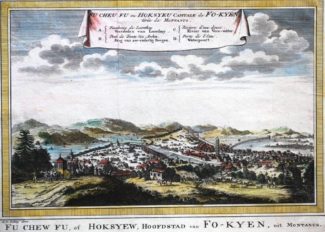FCW1631
| Census ID | FCW1631 |
|---|---|
| Location | Sanshan, Fujian Province, Roman Catholic mission |
| Builder | Unknown, possibly made in the Philippines |
| Specs | Unknown, but probably a positive with 2 or 3 ranks |
| Action | Mechanical |
An instrument, described as a “western qin” (西琴), played by the Lithuanian missionary, Andrzej Rudamina s.j. (1596-1631) for a group of Chinese visitors at the mission at Sanshan in Fujian province on 8 May 1631. (The Project uses FCW (Foochow, Fuzhou) for all installations in Fujian province.)
It is not clear if this was actually an organ, or a harpsichord. But the organ was particularly important to Rudamina’s colleague at Sanshan, Giulio Aleni SJ (1582-1649) who published the first extensive description of the pipe organ in Chinese in his Chifang wai chi (職方外紀, 1623) and later in more detail in Xifang ta wen (西方答問, 1637).
The scholar and Catholic convert Li Jiubiao (李九標), declared after Rudamina’s recital that “it was quite amazing, and made us raise a cheer in admiration.” (Li Jiubao, Koudao richao [口鐸日抄] (Diary of Oral Admonitions), cited in Fang Hao, Zhong Xi jiaotongshi, 中西交通史 (Taipei, 1953) Vol. 5, 6.)
This organ appears in China during a brief period of legalized trade between Macau and the Philippines between 1629 and 1633. As there was an active organ building trade in the Spanish colony by this time, the Project proposes that this organ may have been imported from Manila to Sanshan, either via Macau, or one of the Fujian ports such as Xiamen (Amoy) or Quanzhou at this time. For more information on Philippine-China trade in this period, see the What’s New post on “Further Thoughts on some Philippine Pipe Organs”.
